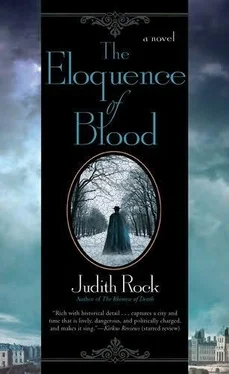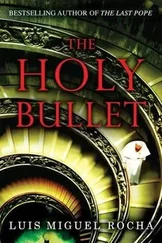Judith Rock - The Eloquence of Blood
Здесь есть возможность читать онлайн «Judith Rock - The Eloquence of Blood» весь текст электронной книги совершенно бесплатно (целиком полную версию без сокращений). В некоторых случаях можно слушать аудио, скачать через торрент в формате fb2 и присутствует краткое содержание. Жанр: Исторический детектив, на английском языке. Описание произведения, (предисловие) а так же отзывы посетителей доступны на портале библиотеки ЛибКат.
- Название:The Eloquence of Blood
- Автор:
- Жанр:
- Год:неизвестен
- ISBN:нет данных
- Рейтинг книги:5 / 5. Голосов: 1
-
Избранное:Добавить в избранное
- Отзывы:
-
Ваша оценка:
- 100
- 1
- 2
- 3
- 4
- 5
The Eloquence of Blood: краткое содержание, описание и аннотация
Предлагаем к чтению аннотацию, описание, краткое содержание или предисловие (зависит от того, что написал сам автор книги «The Eloquence of Blood»). Если вы не нашли необходимую информацию о книге — напишите в комментариях, мы постараемся отыскать её.
The Eloquence of Blood — читать онлайн бесплатно полную книгу (весь текст) целиком
Ниже представлен текст книги, разбитый по страницам. Система сохранения места последней прочитанной страницы, позволяет с удобством читать онлайн бесплатно книгу «The Eloquence of Blood», без необходимости каждый раз заново искать на чём Вы остановились. Поставьте закладку, и сможете в любой момент перейти на страницу, на которой закончили чтение.
Интервал:
Закладка:
“She would have told me if she’d lost it. And when she came here with my father the day you met her, I untied her manteau for her and I saw the outline of the heart under the high neck of her bodice. Someone must have taken it; I think she would have parted with her life before she parted with that little heart!” Isabel Brion gasped and put her hand over her mouth, hearing what she’d said.
“Tell me about the necklace,” Charles said, more because he saw that Isabel needed to talk than because he thought her story would be any help to him. He drank a little more of his wine, which was surprisingly good, and settled himself to listen.
“You can only understand if I tell you where the heart came from,” she said. “I swore never to tell another soul. But now that both Mademoiselle Anne and Martine are gone, I will tell you, if you swear to tell no one else. Their memories must not be tarnished.”
Charles nodded his acquiescence, with the mental reservation that should the story tell him something about the murders, he would have to use it.
Isabel Brion glanced at the open door and leaned toward him across the table. “Maitre du Luc, everyone knows that Mademoiselle Anne Mynette adopted Martine after old Monsieur Simon Mynette died. But what no one but me knows now is that Martine was Mademoiselle Anne’s own daughter.”
Charles’s eyes widened in surprise. No wonder Mademoiselle Anne had suddenly “adopted” a child. “But did Mademoiselle Martine resemble her mother? Would that not have given their secret away?”
“It would. But Martine somewhat resembled her father, her mother told her. Still, though Mademoiselle Anne’s hair was reddish and her eyes were gray, she and Martine both carried themselves with the same elegance. They had truly identical airs. But that was easy enough for people to dismiss as simply how Martine had been raised. Maitre, you must not think ill of Mademoiselle Anne Mynette. Her miserable old father refused to dower her, because she had a misshapen foot and limped badly, and he said that no man of quality would have her. The real reason was that he was too miserly to dower her.” The girl lifted her chin and said defiantly, “I think that if she sinned, it was her father’s fault, not hers.”
Sidestepping that tangled question, Charles said feelingly, “She must have suffered.”
Isabel Brion looked at him in surprise. Her brown eyes were full of questions, but when he said nothing more, she went on with her story. “There was a man Mademoiselle Anne had hoped to marry-so Martine told me-but he left Paris when he realized there would be no dowry. Then, when Mademoiselle Anne was about thirty, there was someone else. They met secretly and her maid helped her. Not that Renee, the maid Martine had-an older woman who died soon after. Mademoiselle Anne’s father was ill by that time, too ill to know whether she was at home or not. And soon-well-Anne Mynette realized that she was with child.”
“What did she do?” Charles said, absorbed in the unfolding tale.
“Until near the end, she was able to hide her condition. With her bodice more loosely laced and those little embroidered aprons some women wear-well, women know things can be hidden. For a time, anyway. Near the end, she arranged to go and stay with her maid’s sister on the Ile de la Cite, and the baby-Martine-was born there. While Anne Mynette’s father lived, of course, she could not bring the baby home. So she found a wet nurse on the Ile and left the baby with her. But first, she put a little red enameled heart on a ribbon around Martine’s neck as a token of her love. Not long after, only about a month later, old Monsieur Mynette finally died. As soon as he was buried, Mademoiselle Anne went to get her daughter from the nurse, but Martine was gone and the house was in an uproar. The nurse had two children of her own, and they had fallen ill a few days before. The younger child had just died when Mademoiselle Anne arrived. A neighbor who was there told Mademoiselle Anne that the nurse had taken Martine to the Hopital des Enfants Trouve-the Foundling Hospital nearby, you know-hoping to keep the baby from falling ill, too. But the poor woman was so distraught over her own children that she hadn’t sent Mademoiselle Anne any message. Well, Mademoiselle Anne was terrified, thinking that Martine might also be ill, or even dead, and she ran to the Foundling Hospital. When the nun there brought the baby, the ribbon with the little red heart was still around Martine’s neck, so Mademoiselle Anne knew that Martine was her own.” Isabel sighed deeply. “Then she took Martine in her arms and they went home, the mother and her beloved child. Mademoiselle Anne hung the heart on new ribbons as Martine grew up, and Martine wore it for the rest of her life, because it was a sign of how much her mother loved and watched over her. Is that not a wonderful story, maitre?”
Charles nodded and smiled. He was touched and warmed by the tale of loving, losing, and finding. “I see how deeply Mademoiselle Anne Mynette loved her daughter.” But the story was of no use in pointing him toward that daughter’s killer. And, he reminded himself, drinking the last of his wine, he should probably not take the story as unadorned fact. As Isabel Brion had told her tale, her voice had taken on the ritual cadence of myth. He could easily imagine Martine’s mother telling her this story. And he could almost hear Martine’s high sweet voice telling her friend this tale of her beginnings as she grew up, telling it always in the same words, rejoicing that she was the cherished child of a beloved mother. And they all lived happily ever after…
“Though she was Mademoiselle Anne Mynette’s natural daughter,” Charles said, “she still needed the donation in order to have what her mother left, is that not so?”
“Yes. If Mademoiselle Anne had told the truth about her child, she and Martine would both have been socially ruined. Besides, illegitimate children cannot inherit like children born of legal marriage, you know. So Mademoiselle Anne told everyone that she hadn’t wanted to live alone after her father died, and had adopted an orphan of respectable parents being cared for by a wet nurse on the Ile. And then she used the donation to make sure Martine would get the Mynette patrimoine.”
“Did Mademoiselle Anne Mynette’s lover know that she had a child? Did he ever see Mademoiselle Martine?”
“I don’t know. Martine said her mother would never talk about him.” She glanced over her shoulder at the open door. “Martine thought he was a great noble,” she whispered, leaning closer to Charles. “A noble who dared not risk having his dalliance known!”
“I see,” Charles said gravely. Well, the two girls must have had an exciting time whispering together as they grew this dazzling paternal family tree for Martine. But whatever his quality, a father there had certainly been. Charles gazed into his wineglass. Could Martine’s father have known her? It didn’t sound likely, but it was not impossible. After all, in some of the old tales-as in life-everyone did not live happily ever after, and fathers could be ogres. But those were tales, and how could a gentle girl like Martine have been a threat to her unknown father, especially after so many years? Charles abandoned that shadowy father for an all-too-real one.
“Mademoiselle, did your father often receive letters from abroad? Had he, perhaps, had letters from abroad recently? From the New World-Mexico, perhaps?”
She blinked at the abrupt change in the talk. “Not from Mexico, but he often had letters from New France. We have relatives there. He had a letter a few weeks before Christmas-an Ursuline sister returning from their mission there brought it.” Mlle Brion smiled sadly. “After my mother died, my father put me with the Ursulines in the Faubourg St. Jacques for schooling. I loved it there. I still visit them sometimes, and they often bring us family letters when they come back from New France.”
Читать дальшеИнтервал:
Закладка:
Похожие книги на «The Eloquence of Blood»
Представляем Вашему вниманию похожие книги на «The Eloquence of Blood» списком для выбора. Мы отобрали схожую по названию и смыслу литературу в надежде предоставить читателям больше вариантов отыскать новые, интересные, ещё непрочитанные произведения.
Обсуждение, отзывы о книге «The Eloquence of Blood» и просто собственные мнения читателей. Оставьте ваши комментарии, напишите, что Вы думаете о произведении, его смысле или главных героях. Укажите что конкретно понравилось, а что нет, и почему Вы так считаете.












